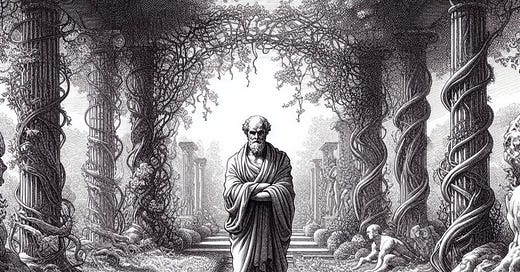In the face of life’s greatest certainty—death—there exists a paradox of fear and transcendence. It’s a subject both daunting and enlightening, woven deeply into human philosophy, mythology, and even our collective acts of courage. In this exploration, let’s revisit the battlefield cry from The Lord of the Rings—“Death! Death! Death!”—and how it mirrors real-life heroism, like the sacrifices on D-Day. These expressions of defiance, courage, and ultimate purpose invite us to view death not as a curse, but as a gift.
Death as a Natural Truth
The Stoics, revered for their philosophical clarity, approached death with an unflinching lens. They regarded it as neither good nor bad, but simply as part of life’s natural order. For them, the practice of memento mori—meditating on death—was central to living well. By embracing mortality, we gain perspective, prioritize what truly matters, and temper the fear that so often accompanies the thought of our end.
Yet, even within their stoic acceptance, they acknowledged the innate human response to death: fear. It’s a fear so primal and persistent that it shapes our choices, behaviors, and even societal constructs. And yet, in both fictional and historical contexts, this fear becomes a crucible for courage.
The Cry of Defiance
In The Lord of the Rings, King Théoden’s battle cry—“Death!”—before charging into near-certain annihilation, is more than a declaration of mortality; it’s a bold assertion of courage. It’s a moment where fear is not denied but embraced, channeled into something greater than self-preservation. This mirrors the actions of those soldiers storming the beaches of Normandy on D-Day. They faced the reality of death head-on, transforming fear into resolve and selflessness.
There’s a defiance in screaming “death” in the face of danger. It’s a rebellion against forces—both external and internal—that threaten to paralyze us. This defiance isn’t just physical; it’s spiritual. It declares, “I will not let the inevitability of death deter me from doing what is right.”
Death as a Gift
In Tolkien’s mythos, mortality is framed as a divine gift to humankind. The immortal elves, unbound by death, are often portrayed as detached and indifferent, their lives untouched by the urgency and meaning that mortality grants. In contrast, the fleeting nature of human life imbues it with poignancy and purpose. The Greeks, too, recognized this in their mythology, where gods envied mortals for their ability to live with passion, knowing their days were numbered.
This perspective shifts the narrative of death from curse to opportunity. The knowledge of our impermanence pushes us to love deeper, strive harder, and savor the fleeting moments of joy. It drives us to acts of heroism and compassion that would be meaningless in a world without endings.
Courage Through Mortality
Epictetus once argued that death is a choice, a freedom that grants us agency even in the most oppressive circumstances. This radical view reframes mortality not as a limitation, but as an enabler of virtue. Without the stakes of death, courage ceases to exist. Acts of bravery, sacrifice, and resilience become hollow in a world where life is infinite.
Consider the young men of D-Day. Their mortality was not a deterrent but a motivator. Their willingness to face death transformed their fear into legacy, their lives into symbols of courage and hope. They transcended death by giving their finite lives meaning—a purpose greater than themselves.
The Duality of Life and Death
Death and life are two sides of the same coin. To wish away one is to deny the existence of the other. Our fear of death often blinds us to its role in shaping the beauty and significance of life. Without death, there is no urgency, no reason to cherish a sunset, mend relationships, or pursue our dreams.
The meditation on death, then, is not an exercise in despair but in gratitude. It reminds us that life is precious precisely because it is fleeting. It encourages us to act with intention, to live virtuously, and to prioritize what truly matters.
Transcending Death
The cry of “Death!” is more than a call to arms—it’s a spiritual affirmation. It’s the courage to accept mortality and the clarity to live meaningfully despite it. In both fictional battles and real-world heroism, this defiance of death reflects humanity’s unique role in the cosmos: to find purpose in the face of the inevitable.
Death, in the end, is not an end but a beginning. It is a gift that reminds us to live fully, to love deeply, and to leave behind a legacy that transcends the finite boundaries of life. By embracing this perspective, we move beyond fear and into a state of hope, meaning, and transcendence.
**If you’d like to become a paid member but cannot afford it, feel free to contact me directly; I’ll happily provide a complimentary membership (no questions asked).
Stay Connected
Brandon Tumblin is most well-known for his podcast, The Strong Stoic Podcast, where he discusses philosophical ideas (solo and guest episodes).
Brandon is also a writer for THE STOIC, the official journal of The Stoic Gym.




